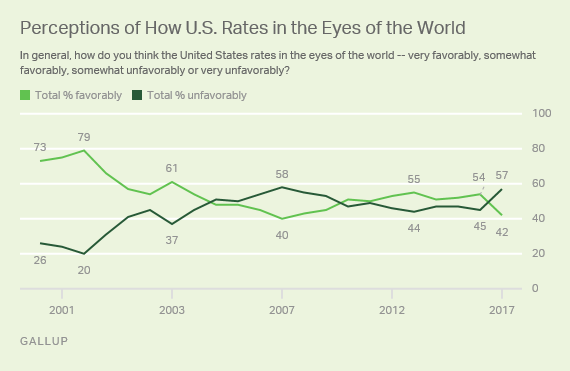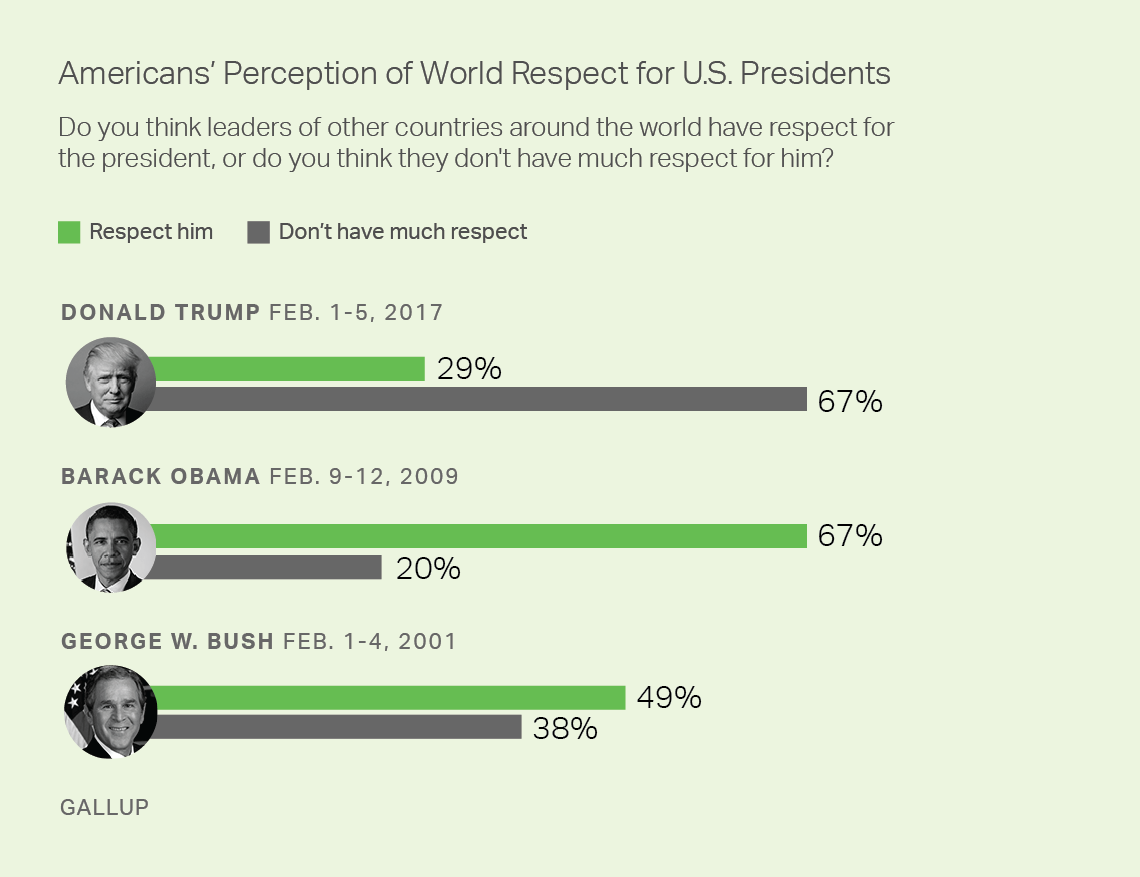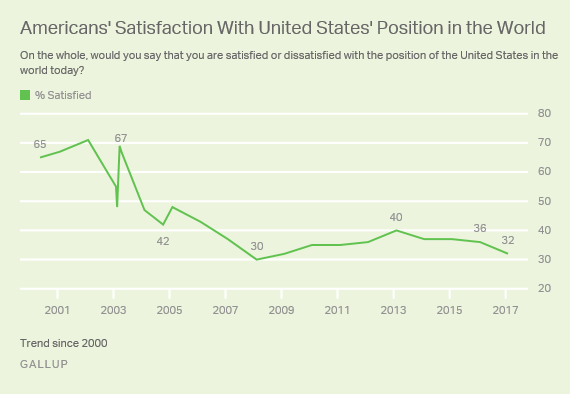Gallop Says Americans See US Standing at Its Worst in a Decade
- 42% of Americans believe the world views the U.S. favorably
- 29% say world leaders respect Trump; 67% said same of Obama in 2009
- Satisfaction with U.S. on the world stage is near record low
WASHINGTON, D.C. -- Americans believe the world at large sees the U.S. more unfavorably (57%) than favorably (42%), their worst assessment of the country's image in 10 years. A year ago, Americans' perceptions were more positive than negative.

These results are from a Gallup survey conducted Feb. 1-5, about two weeks into Donald Trump's presidency. The 42% favorable rating is one of the lowest since Gallup began asking this question in 2000 and may be attributable to the election of Trump, whose sometimes controversial statements and actions have rankled several world leaders. However, Americans' perceptions of the image of the U.S. abroad were marginally worse in 2007, when 40% thought the world viewed the nation favorably. At the time, the U.S. was embroiled in wars in Iraq and Afghanistan, and President George W. Bush was highly unpopular.
The high-water mark for Americans believing the U.S. is viewed favorably was 79% in 2002, in the wake of the 9/11 terrorist attacks in the U.S.
Much of this year's drop in favorable perceptions of how the world views the U.S. is fueled by a precipitous slide among Democrats now that a Republican president is in office. Currently, 31% of Democrats think the world views the U.S. at least somewhat favorably, down from 68% last year. By contrast, Republicans' views have improved this year, to 54% from 39%, but not enough to offset the decline among Democrats.
Few Americans Believe Leaders Worldwide Respect Trump
Fewer than three in 10 Americans (29%) say leaders of other countries have respect for the new president, with 67% saying world leaders do not have much respect for him. When Barack Obama took office in 2009, the results were nearly opposite: 67% of Americans then believed global leaders respected the president, while 20% said leaders did not. At the time of the prior presidential transition in 2001, more Americans also believed George W. Bush was respected than believed he was not.

The 29% now believing that world leaders respect the president also represents a sharp drop from one year ago, in the last year of Obama's presidency. At that time, 45% said they believed the president was respected.
One reason for the drop is that fewer Republicans today think Trump is respected (60%) than Democrats in 2016 thought Obama was respected (79%).
Satisfaction With World Position Little Changed From 2016
Despite Americans' depressed perceptions of how world leaders view their new president, Americans' satisfaction with the country's position in the world hasn't changed much from last year -- 32% say they are satisfied with the position of the U.S. worldwide, down slightly from 36% in 2016.

The current reading continues a recent trend of relatively low satisfaction with the nation's global status, something that has persisted since the Iraq War troop surge in 2007.
While the Iraq War may have been a factor a decade ago, satisfaction has remained low even as U.S. involvement has wound down. The rise of the Islamic State and terrorism in general may be contributing to Americans' continued low level of satisfaction with their country's position in the world. Americans' widespread dissatisfaction with the way things are going in the U.S. could also affect their level of satisfaction with the nation's world standing.
Bottom Line
At the beginning of Trump's presidency, Americans' perceptions of how the world views the U.S. and its new president are significantly worse than they were a year ago -- and are on the low end for the past decade. This has been fueled by a sharp decline among Democrats who hold highly negative views of Trump's character and opening job performance.
But even a year ago, when Americans thought the world viewed the U.S. and Obama positively, Americans were still largely unsatisfied with the nation's global standing. This trend has been steadily negative for the past decade. Americans may not put much weight on how the rest of the world perceives the president in assessing whether they are satisfied with the United States' standing in the world. In addition to concerns about international matters such as Syria and terrorism, those views may be influenced by how they think things are going in the U.S., their low confidence in public institutions and their low trust in government. Such factors appear to have a marked effect on how Americans feel when they look beyond their borders.
by Art Swift
by Art Swift
Historical data are available in Gallup Analytics.
SURVEY METHODS
Results for this Gallup poll are based on telephone interviews conducted Feb. 1-5, 2017, with a random sample of 1,035 adults, aged 18 and older, living in all 50 U.S. states and the District of Columbia. For results based on the total sample of national adults, the margin of sampling error is ±4 percentage points at the 95% confidence level. All reported margins of sampling error include computed design effects for weighting.
Each sample of national adults includes a minimum quota of 70% cellphone respondents and 30% landline respondents, with additional minimum quotas by time zone within region. Landline and cellular telephone numbers are selected using random-digit-dial methods.
Comments